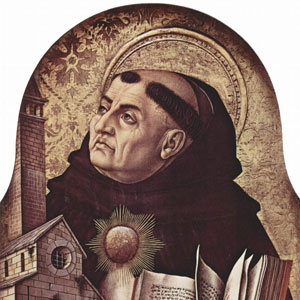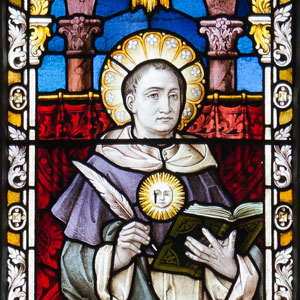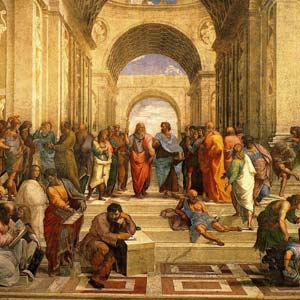14 Articles Written by Matthew Minerd

The Divine Legality or a Legal Divinity? The Eternal Law Briefly Considered
Among the species of law, Aquinas numbers the “eternal law” as foundational for the natural law. What is meant by this type of “law”, and what are its implications for the relation between morality and revelation / theology? This article assays some basic themes pertaining to this question. Read Article
Written by Matthew Minerd on August 13th, 2014. Subject: Philosophy. Filed in Ethics, about
Aquinas
Anscombe
Natural Law
Eternal Law

Promulgation and the Analogical Scope of the Notion “Law”
The law is something “promulgated”—or so Aquinas states in his common definition of law. This seems quite acceptable in the case of human, positive law. However, how can one speak of a “promulgation” of the natural law, let alone the eternal law? This article is a discussion of the general themes involved in considering this problem. Read Article
Written by Matthew Minerd on June 9th, 2014. Subject: Philosophy. Filed in Ethics, about
Aquinas
Maritain
Natural Law
Eternal Law

Types of Law — The Beginnings of an Analogical Expansion
The term “law” is most easily understood in terms of the positive law that we experience in our day-to-day life. In order to discuss “natural law” without being equivocal in our use of language, we need to consider how it can even be possible to transition from discussing the case of positive “law” to that of natural “law.” Read Article
Written by Matthew Minerd on April 21st, 2014. Subject: Philosophy. Filed in Ethics, about
Aquinas
natural Law

Thomas Aquinas’ General Definition of Law
A consideration of Thomas Aquinas’ general definition of law. These reflections will serve as the basis for probing the implication of this definition, ultimately aiming to treat the natural law in its proper boundaries. Read Article
Written by Matthew Minerd on March 25th, 2014. Subject: Philosophy. Filed in Ethics, about
Aquinas
natural Law

Natural Law: Eternally Returning, Ever Controversial
Many well-meaning philosophical ethicists appeal to some notion of “natural law”, as though this notion accounts for the fundamental aspects of moral philosophy. However, the domain of discourse for “law” is an explicitly inscribed one. In this article, we will note Aquinas’ placement of the “conceptual space” for discussions of “law and the natural law.” Read Article
Written by Matthew Minerd on February 28th, 2014. Subject: Philosophy. Filed in Ethics, about
Aquinas
natural Law

Not All Idealisms are Equal—The Case of George Berkeley
Although the term “idealism” is used in many senses to describe various trends in epistemology, each case is most illuminatingly understood in its historical context. To understand Berkeley's idealism, we must understand it as a reaction to Locke. Read Article
Written by Matthew Minerd on February 6th, 2014. Subject: Philosophy. Filed in Epistemology, about
Berkely
Hume

Intelligibility in the World of Experience
The way we know the world determines to a large extent our ability to understand what a thing is, such as a tree or an animal. This in turn forms our understanding of the intelligibility in the world itself Read Article
Written by Matthew Minerd on December 6th, 2013. Subject: Philosophy. Filed in Epistemology, about
Ontology
Maritain

Thomas Hobbes and Nominalist Logic
In his Leviathan, Thomas Hobbes outlines the character of speech, and words which are the components of speech. His assumption that words only nominally represent particulars affects how he understands propositional logic. Read Article
Written by Matthew Minerd on November 21st, 2013. Subject: Philosophy. Filed in Epistemology, about
Thomas Hobbes
Leviathan

Thomas Hobbes and the Natural Good
In his Leviathan, Thomas Hobbes rejects the Ultimate End and the Ultimate Good in favor of the natural end and the natural good of man. Man, because of his desires, must always aim to acquire power in order to maintain his estate. Read Article
Written by Matthew Minerd on November 12th, 2013. Subject: Philosophy. Filed in Moral Philosophy, about
Thomas Hobbes
Leviathan

Augustine and the Role of the Church within the Political Order
In his City of God Augustine raises the question of what the relationship is between the civil political order and the ecclesiastical order. How ought a church interact with the state? Read Article
Written by Matthew Minerd on October 14th, 2013. Subject: Theology. Filed in Political History, about
Augustine
politics

The Seven Liberal Arts are Speculative Sciences
The division of the sciences, especially of the liberal arts from the other sciences, is propaedeutic for knowing and understanding the world around us. Read Article
Written by Matthew Minerd on October 17th, 2013. Subject: Philosophy. Filed in Epistemology, about
Liberal Arts
Aquinas

Hierarchy and Independence among the Sciences, Especially Philosophy and Theology
During the Middle Ages, the rediscovery of Aristotelianism brought about the question of what the relationship between each science was. Is there a natural hierarchy? Can any science be understood independently of the other sciences? Read Article
Written by Matthew Minerd on September 30th, 2013. Subject: Philosophy. Filed in Epistemology, about
Aquinas

Monastic Life: Passing from the Practical to the Speculative
Although monasticism of the Medieval Ages encouraged the formation of schools and the preservation of learning, still their primary aim was the contemplative life. Read Article
Written by Matthew Minerd on September 24th, 2013. Subject: History. Filed in Monasticism, about
Benedict
Christianity

Simplicius and Aquinas on Aristotle’s Categories
A comparison is made between the Thomistic and the Neo-Platonic notion of signs, and how such signs relate to our knowledge of the world. Read Article
Written by Matthew Minerd on September 16th, 2013. Subject: Philosophy. Filed in Epistemology, about
Simplicitus
Aquinas
Aristotle
Logic











